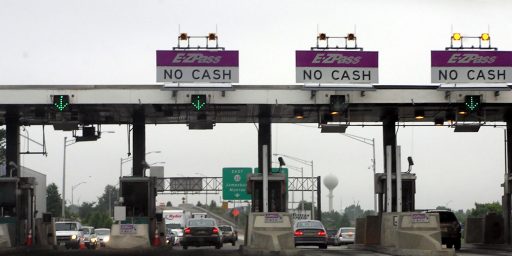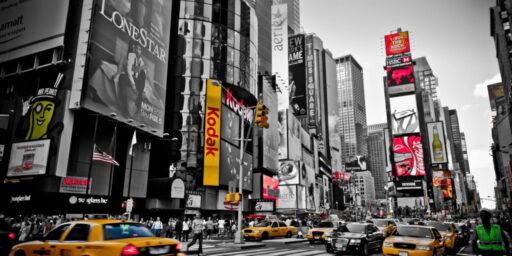Paying to Drive: Making Every Road a Toll Road
If people had to pay tolls everywhere they drove, they’d drive less according to a recent study. While the main finding was rather obvious, the study has some interesting implications.
For about eight months, drivers in 275 Seattle-area households agreed to pay for something the rest of us get for free: The right to drive on the region’s freeways and streets. They were guinea pigs in a pioneering study that explored how motorists’ behavior might change if they had to pay tolls — not just on a few bridges or highways, but on almost every road with a yellow center line.
Researchers established virtual tolls ranging from a nickel to 50 cents a mile. They gave participants pre-paid accounts of between $600 and $3,000, and told them they could keep whatever the tolls didn’t eat up. The experiment ended in February. Preliminary results, released this month, suggest that if such so-called “road pricing” were widespread, it could make a significant dent in traffic.
[…]
Participants in the Puget Sound Regional Council’s “Traffic Choices” study had devices mounted on their dashboards in late 2004 and early 2005 that tracked their travel and transmitted the information to a central computer. Tolls, which varied by road and time of day, were deducted electronically from the pre-paid accounts, which were funded by the study’s sponsors and sized to match how much participants had been driving before the study.
The promise of keeping some of that money proved to be a powerful incentive. Nearly 80 percent of the participants drove less than they did before, or they changed their routes or travel times to avoid the highest tolls, said Matthew Kitchen, the study’s director. When the study was finished, the average payout was nearly $700 per household.
When other variables are factored out, Kitchen said, participants took 5 percent fewer auto trips and drove 2.5 percent fewer miles each weekday because of the tolls. The drop was even more dramatic during peak-traffic periods, when tolls were highest: 10 percent fewer trips and 4 percent fewer miles in the morning, 6 percent fewer trips and 11 percent fewer miles at night.
[…]
Such systemwide tolls could have an even greater impact in the real world than the preliminary study results indicate, Kitchen said. For starters, a real-world toll scheme presumably would reduce congestion, he said. Traffic Choices participants didn’t get that benefit in return for the tolls they paid. Real toll payers also might be motivated to drive even less because they would be paying out of their own pockets, not with cash provided by the study. Finally, systemwide tolls could lead to long-term changes in driving behavior — moving closer to work, or finding a job closer to home — that Traffic Choices drivers had no reason to make, Kitchen said.
The Netherlands plans to implement such a system nationwide by 2012. It will face much more resistance here, though. We’ve come to regard driving as an absolute right and expect roads to be a public good.
Still, toll roads have caught on in heavily congested areas. When I lived in the Loudoun County exurbs, I took the Dulles Greenway and Toll Road daily on my commute into the Beltway in order to bypass the maddening congestion on Route 7. There are plans to create High Occupancy Toll (HOT) lanes on the I-495 Beltway to allow those willing to pay to drive solo in carpool lanes to buy their way out of traffic. And those driving along I-95 through New Jersey and Delaware have for decades had to pay tolls for the privilege of driving on the Interstate highway system.
The problem with a pay-per-mile system, though, aside from issues of privacy, is that tolls have a variable impact on behavior depending on affluence. The very wealthy won’t think twice about driving whenever they please; the very poor may simply not be able to afford driving at all. Intrinsically, there’s no problem with that. There are all manner of things the well-off can buy that the less fortunate can not. Still, Americans have long considered the ability to use the roads a birthright. Charging for it will be seen as taking away a basic freedom. That will not go over well, regardless of whether it makes practical sense.






I submit we’re already paying on a per mile basis for roads. What is the exorbitant tax on fuel, then a tax per mile?
Bithead: To some extent, that’s true. Still, there’s a differential in terms of vehicle miles per gallon. And there’s no differential (aside from minimally reduced fuel economy) paid for driving during peak traffic periods or on particularly congested roads.
The tested system is far more nuanced and intrusive than a gas tax.
When the government gives me a full refund of all the taxes I have paid over the years to build and maintain roads, bridges and freeways… then it can start charging me to drive on them.
Until that refund arrives, I have, in my view, already paid… many times over.
Where I live the poor would starve if they couldn’t afford to drive. Many, many people in rural Washington make a marginal living selling some kind of service: hauling, tree cutting, elder care, dog walking, carpentry…but, I suppose, this proposal is primarily for urban areas?
We do have to face up to the complexities of the economic dislocations that will come with the end of the oil economy. I hope the problems will be addressed practically, rather than ideologically.
fuel tax at the pump already makes “every road a toll road” and is an appropriate way to build & maintain roads.allowing the government to monitor and charge for each mile driven would deal the death blow to what little freedom is left. the minor reductions in miles driven that the study claims could be had with a small increase in fuel price. plus the toll system does nothing to encourage the purchase of more fuel efficient cars. fewer miles driven means fewer business transactions and a chilling effect on the economy while padding the pockets of those who seem compelled to suppress liberty and oppress the citizenry.
large toll can reduce traffic on some roads, but what happens to the traffic on the alternative routes where the diverted traffic goes?
Your example of Dulles Greenway vs route 7 is exactly what I’m talking about.
Unless the toll reduces overall traffic rather then just diverting it elsewhere tolls are not a solution.
In many parts of Europe, the autoroutes/autostradas have been, in effect, toll roads for decades. This has led to most drivers to bypass the faster autoroutes for the local two lane “national” roads. The autoroute fees can be quite exhorbitant.
Well, it’s certainly more visible.
Good call on the wealth issue regarding this toll study. In my write up, I proposed car value as one way to graduate the tolls (people with cheaper cars pay less).
Slightly offtopic: tolls haven’t paid for the Veterans Expressway in Tampa. Part of the reason is there is I-275. It’s easy to avoid to using the Veterans. Part of the problem in the Tampa area is the projects become pork. They’re built to raise real estate values. Not ease congestion. Tolls aren’t always the money generator politicians believe they are.
Mike;
So it was with the ‘Bridge to nowhere’. The property values on the far side of that bridge would ahve gone up in dramatic fashion, had the thing been built.
But then again, that’s always the effect of a road being built or improved; the property values always improve with the road.
This idea is just another revenue generator.
Fuel taxes do NOT make “every road a toll road”; you pay them no matter what kind of road you drive on, yet many of those roads never see one lousy penny of fuel tax money (instead being constructed, maintained, reconstructed, and expanded through property and sales tax funds).
The regressivity argument is a bit harder. Gas taxes aren’t regressive across all income levels – due to the fact that poor people (in most metro areas) barely drive at all, and when they do, drive far more fuel-efficient vehicles than the exurban upper middle class. Tolls on the other hand charge exurban Expeditions the same per-mile rate as they do the old Civics and Corollas favored by the poor. But the property/sales tax implications still make tolls a better deal overall for the urban poor.
The rural poor are just screwed either way, unfortunately.
“the very poor may simply not be able to afford driving at all. Intrinsically, there’s no problem with that.”
Why what a wonderful “lets keep the poor in ghettos” mentality!
“the very poor may simply not be able to afford driving at all. Intrinsically, there’s no problem with that.â€
Yes, the intrinsic problem with libertarianism.
matt: That is followed by “There are all manner of things the well-off can buy that the less fortunate can not. Still, Americans have long considered the ability to use the roads a birthright. Charging for it will be seen as taking away a basic freedom. That will not go over well, regardless of whether it makes practical sense.”
travel is not only a basic freedom in many cases it is a necessity…once you curtail that necessity with exorbinate fees and taxes you are in effect locking people into a location…say a poor person hears of a job in another state, how are they to pay for the chance to interview for that job? Say you live in the inner city and now have to pay to travel for groceries, medical attention, continuing education, do charity workers now have to pay to help etc!
Why doesn’t the govt stop sucking up to the oil companies and discuss viable mass transit…every other developed country in the world has…why not us?
matt: We’ve got viable mass transit in the urban areas. We just don’t have the population density to make it work in the rural areas.
As James notes, most of those who bleat that the poor have no choice but to drive are either woefully misinformed or willfully disingenuous. Metro areas all over the country have bus and rail systems – and poor people USE them. (The difference between good and bad transit cities is that in the good ones, the middle class uses it too – not that the poor all drive too).
miek; they do in illinois. motor fuel tax is distributed to state roads and to counties, townships and municipalities based on population, then need. i served on the board of a small rural town for thirteen years. during that time the streets AND sidewalks were paid 100% buy motor fuel tax money. the town did not even have a gas station.
floyd,
Many states distribute SOME of the state fuel tax down, but none of them come anywhere near ALL roadway spending. Your town doubtlessly paid for some street costs via the property and/or sales tax.
miek, read what i said.